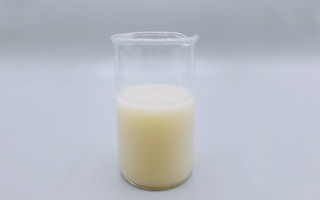In the scramble for a healthy alternative to cow’s milk that doesn’t cost the earth, a Singapore startup has developed a new type of dairy substitute made from microalgae.
To continue reading, subscribe to Eco‑Business.
There's something for everyone. We offer a range of subscription plans.
- Access our stories and receive our Insights Weekly newsletter with the free EB Member plan.
- Unlock unlimited access to our content and archive with EB Circle.
- Publish your content with EB Premium.
A claimed world-first, the algae-based milk is comparable in nutritional value to cow’s milk, but is made using a fraction of the energy, land and water.
Maker Sophie’s Bionutrients grows the microalgae in large fermentation tanks, and feeds it food waste such as spent beer grains. The result is a water-soluble protein flour which can be used to make milk products.
“Microalgae has the essential amino acids the body needs, and also the vitamins that are lacking in other types of plant-based protein flour. Nutritionally speaking, it functions like an animal protein,” said Sophie’s Bionutrients founder and chief executive Eugene Wang, who believes microalgae is a “superfood of the future.”
The new milk alternative does not taste like cow’s milk but it has a similar texture to nut-based milk. Wang said that it is up to food manufacturers to add flavouring and tweak the texture by adding fat so that it has a similar creaminess to dairy milk. “We sail the ship, it’s up to others to fill the deck,” he said.
Sophie’s Bionutrients is currently trying to raise $10 million in funding for the project. The biggest cost is in obtaining the land and fermentation tanks to scale production, Wang told Eco-Business.
Singapore will be the initial production base, but the company is looking to expand to countries where the land costs are lower, and there is a more readily available source of feedstock to grow the microalgae, Wang said. His new innovation has yet to be named.
Wang said he expects his new formula to be cheaper than cow’s milk or soy milk within 5-10 years. It is already cheaper to produce than newer dairy alternatives, like cellular lab-grown milk.
Sophie’s Bionutrients microalgae flour can be used to develop a range of different foods, and the company, which was previously named Sophie’s Kitchen, won the 2019 edition of The Liveability Challenge, a sustainability innovation competition, for its meat alternative protein.
The global market for alternative protein is set to be worth US$16 billion by 2025, and the market for dairy-free milk has grown 8 per cent every year over the past decade. Wang said that while the Covid-19 pandemic has raised interest in sustainability in Asia, there is still a preoccupation among technology investors in innovations such as artificial intelligence and cryptocurrencies, rather than solutions that can improve agriculture and food production.
“There are some challenges being based here [in Asia], but we’re still very optimistic that we can close the current round of funding,” said Wang, who has said he wants to help “transform Singapore into a protein export powerhouse”.














